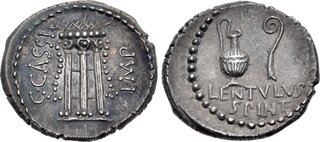| Classical Numismatic Group > Triton XXVII | Auction date: 9 January 2024 |
| Lot number: 619 Price realized: 2,750 USD (Approx. 2,519 EUR) Note: Prices do not include buyer's fees. | Show similar lots on CoinArchives Find similar lots in upcoming auctions on |
| Lot description: The Republicans. C. Cassius Longinus. Spring 42 BC. AR Denarius (19mm, 3.99 g, 6h). Military mint, probably at Smyrna; P. Cornelius Lentulus Spinther, legatus. Tripod surmounted by cortina and two laurel branches, fillet hanging on either side; C • CASSI upwards to left, IMP upwards to right / Capis and lituus; LENTVLVS/SPINT in two lines below. Crawford 500/1; CRI 219; Sydenham 1308; RSC 7; BMCRR East 79; Kestner –; RBW 1761. Deep iridescent toning, minor marks, reverse slightly off center. EF. Rare. Ex Triton XII (6 January 2009), lot 518. Shakespeare depicts the "lean and hungry" Cassius as primary ringleader in the conspiracy against Julius Caesar, motivated more by envy than love of liberty. The Bard gets the basic facts right, but omits the details of Cassius' colorful career. Born into a senatorial family but lacking any talent for politics, Gaius Cassius Longinus found soldiering more to his liking and joined the triumvir Crassus on his doomed expedition against the Parthians in 53 BC. Cassius managed to rescue himself and a handful of others from the massacre and escaped to Roman Syria, where he remained for another two years ably defending the province from Parthian attack. He returned to Rome as a war hero in 51 BC and fell in with the Pompeian faction, serving as commander of Pompey's fleet during the civil war of 49-48 BC. After Pompey's defeat and death, Cassius accepted a pardon from Caesar and loyally served him for the next four years. Cassius perhaps hoped to attain supreme power once Caesar retired, but it soon became apparent the dictator had no intention of stepping down. Thus, Cassius suborned his close friend Marcus Junius Brutus and several other senators into a conspiracy, and he was one of the first to plunge his dagger into Caesar on the Ides of March, 44 BC. After fleeing Rome with the other conspirators, Cassius returned to Syria and commandeered several crack legions and a fleet, which he used to attack and pillage the wealthy island of Rhodes in order to procure gold for the approaching civil war. He joined forces with Brutus in 42 BC and the two marched into Thrace to meet the pro-Caesarian legions led by Mark Antony and Octavian. Though their army outnumbered the Caesarians, Cassius and Brutus seemed oddly fatalistic and made a suicide pact should either meet defeat or capture. At the first clash at Philippi in early October, Cassius suffered a reverse and rashly fell on his sword before he could be told that Brutus had counterattacked and saved the day. Demoralized by his friend's death, Brutus was easily defeated three weeks later and took his own life. The obverse of this rare denarius closely copies the reverse of the aureus struck by M. Aquinius, and was probably minted on the occasion of the meeting in Smyrna between Cassius and Brutus. The capis and lituus, symbols of the pontificate, recall Spinther's election to that college in 57 BC. Estimate: 1500 USD |  |



